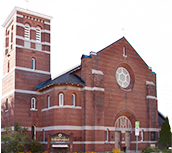Hands
By Rev. Canon Stewart Murray, Incumbent at St. Barnabas, Ottawa
(This article appears in the September 2017 edition of 'Crosstalk', the newspaper of the Diocese of Ottawa.)
God has a marvelous way of showing us His presence in our lives, often in simple and unexpected ways. I had been struggling with writing this article before I left the parish for some holidays, and the deadline was fast approaching, with little progress being made. Just when I thought I would have to give up, my sister, who is in the midst of downsizing, brought in to the office some items she thought I might be able to find a home for. One of them, a simple plaque with the famous painting of the Prodigal Son by Rembrandt – a familiar image I have seen countless times – caught my attention, especially the weathered hands of the father as they embrace the returning son.
The parable of the Prodigal Son in the Gospel of Luke had always spoken to me of mercy and forgiveness, but the intimacy of the scene captured by the artist demanded deeper reflection. The image of the father’s hands, hands weathered by work and age, hands that had held his sons as infants, that had guided them as they grew into young men, hands that had bid the younger son farewell when he “took his journey into a far country” (Luke 15:12) brought to mind the other image of hands that has always been meaningful for me. This is the hands in the Dali painting of Christ of St. John of the Cross, a print of which hangs over my desk. The hands, which are pierced with nails, are the rough hands of a carpenter, weathered and worn. These are the hands that had lovingly toughed the eyes of the man born blind, that had been laid upon the sick to heal them, that had taken children into Jesus’ arms to bless them, and that had taken bread and broken it at the Last Supper. How powerful are hands in expressing a person’s life. Many times I have taken the hand of someone who was dying and felt the warmth of life in a hand that had beloved children and grandchildren, but also the roughness of a hand that had known hard work.
In the touch of a hand, we can feel a sense of love and encouragement, but our hands can also express fear. A clenched fist or the unwillingness to put out a hand in greeting and friendship speak far louder than words. I think that is why the image of the father of the Prodigal Son moved me so deeply. The father’s hands were hands that expressed forgiveness, love, and acceptance; they were not raised in anger or judgment, but opened to receive the “…brother [who] was dead, and is alive; he was lost, and is found” (Luke 15: 32). The image speaks of the grace of God, who freely gives to all who turn to Him, His presence and love without preconditions or judgement, but with the joy of a Father whose child was lost and now has returned.
The father in the return of the Prodigal Son is an important model for us as individual Christians and as parish communities. The story invites us to examine our hearts and our communities, and to ask: Are we ready to open our hands and our hearts to the people that God will place in our lives and whom He will bring to the doors of our churches? The parable challenges us to be intentional and attentive in how we welcome and invite others into our lives and communities. I often pray that I will not be a hindrance to another soul as they seek Christ, but rather that I will be an instrument of God’s grace. May God grant my prayer.

